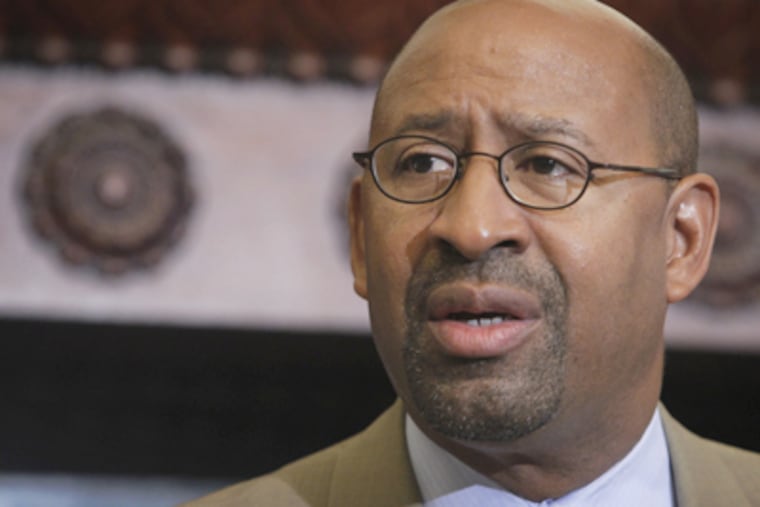Property reassessment figures bolster Nutter's position on AVI
The preliminary numbers for Philadelphia's citywide property reassessment have arrived, and they appear to be good news for Mayor Nutter and advocates of his tax-reform effort.

The preliminary numbers for Philadelphia's citywide property reassessment have arrived, and they appear to be good news for Mayor Nutter and advocates of his tax-reform effort.
The data - while incomplete - show that the property-tax rate under a new system would be considerably lower than the ruinous rate predicted by City Council this year.
Nutter on Wednesday called the nearly completed reassessment of 579,000 parcels "an important milestone" in fixing the city's infamously inequitable property tax system.
"This is something I've been looking at and focusing on for pretty much all my elected life," he said. "We owe the citizens this, and we've owed it to them for a long, long time."
As the planned changeover to the new system is made next year, Nutter pledged not to seek a property-tax hike, which would be the first time in three years without an increase.
"There's been no discussion at all, anywhere, about sending over a bill to increase real estate taxes," he said. "It's just not a topic of conversation."
The reassessment so far has tagged the market value of all taxable property in the city at $96.5 billion. To collect the same amount of property tax in the next fiscal year - $1.2 billion - the administration figures the tax rate would have to be 1.3 percent of a property's value, if no tax relief measures are added.
That means the owner of a home worth $100,000 would pay $1,300 under the 1.3 percent scenario, or $2,600 for a $200,000 property, an equation Nutter called "the ultimate in just mathematics."
The average residential property tax bill is now about $1,400, but that's based on a system with wildly disparate assessments that usually don't reflect actual market value. Much work remains to determine how individual homeowners and neighborhoods would be affected under the new system.
This spring, when Nutter asked Council to implement the Actual Value Initiative (AVI), the members balked at acting before the reassessment was completed, particularly when a consultant said the tax rate could be as high as 1.8 percent - $1,800 for every $100,000 of property value.
Councilman Bill Green called the numbers revealed Wednesday "real good news for taxpayers."
"Now that we finally have the data, hopefully people can relax," he said.
Some Council members said Wednesday that 1.3 or 1.4 was still too high, and that they would have to find ways to bring the rate down.
"I just think people are getting crushed here," Councilman James F. Kenney said. "The problem with the whole process is trying to make this magical revenue number. This process was supposed to be about getting a fair assessment."
While AVI is meant to fix decades of inaccurate assessments - some the result of political manipulation - the correction of basing taxes on a property's actual market value is going to have some seismic effects.
Many poorer neighborhoods, where residents have been paying too much, are going to get a tax break. Many wealthier neighborhoods, especially ones that have seen explosive growth in recent years, could experience huge increases.
Elected officials and civic groups from burgeoning areas like Northern Liberties and Graduate Hospital have warned that longtime residents will not be able to afford the new bills, while saying AVI will have a grim impact on the housing market.
"At a 1.3 percent rate, there would still be enormous increases in growth areas of the city," Controller Alan Butkovitz said Wednesday. "None of this addresses that shock."
Nutter said he was focused on creating a fair and equitable system - a task, he noted, begun by a voter referendum for change in 2010.
He also said people who moved into neighborhoods like Graduate Hospital knew they were going into a hot area with artificially low taxes.
"In their heart of hearts . . . they have to look at that bill and say, 'There's no way in the world I'm paying the right tax amount,' " Nutter said. "All we're asking you to do is pay your fair share."
Much of the debate in Council this spring, several members said, is going to focus on relief measures, such as the proposed $30,000 homestead exemption, which would allow homeowners to deduct that amount from their assessments before the tax rate is applied.
The administration said the tax rate with the homestead exemption would have to be 1.4 percent, and 1.3 percent without it. But that would still be good news for homeowners - the owner of the $100,000 home would be taxed on only $70,000 of value, producing a tax bill of $980 instead of the $1,300 without the homestead exemption.
Council also has to consider the Kenney-led bill to provide relief to longtime residents in gentrified neighborhoods. Each $10 million in tax relief raises the overall tax rate by 0.01 percent.
The city's Office of Property Assessment also needs to look again at about 16,000 parcels with various "anomalies," Nutter said. The results, expected in a few weeks, could raise the aggregate value by a few billion dollars, thus lowering the tax rate.
Most important, Council is awaiting more specific data on how the new tax system would affect individual neighborhoods, broken into data subsets known as geographic market areas.
The administration has promised that data before Council reconvenes on Jan. 24. About three weeks later, the city plans to begin mailing out reassessment data to owners, finally letting them know what the city thinks their properties are worth.
Councilman Mark Squilla, who led the effort this spring to delay AVI's implementation, said he could not predict how the budget fight would unfold without that data.
"I think we have to find a way to do" AVI, he said. "I'm sure we're going to go through some battles along the way."